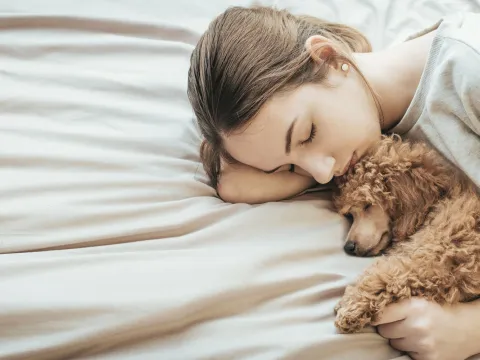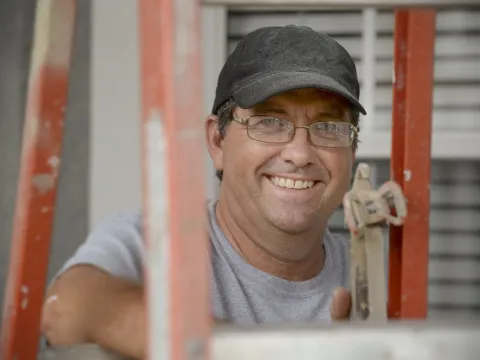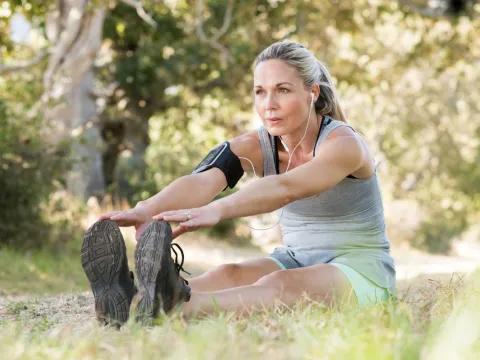- AdventHealth

As we get older, just about every aspect of our body undergoes changes. Sleep is no exception.
Where we once might have naturally stayed up late, our bodies become ready for sleep earlier at night. In the past, sleeping late on weekends may have been one of life's little pleasures; now, you find yourself waking up even before the rooster crows.
These changes tend to be a normal part of the aging process, stemming from shifts in our circadian rhythm the body's internal sleep-wake clock.
We don't know exactly why our sleep habits change as we age, says sleep expert and neurologist Holly Skinner, DO. One possible explanation lies in changes to a part of our brain called the suprachiasmatic nucleus, which regulates sleep and other body rhythms.
Contrary to common belief, older people don't require less sleep than young or middle-aged adults. The amount of sleep your body needs stays about the same throughout adulthood, but the architecture of that sleep undergoes significant shifts.
As we get older, our daily schedules are often not as regimented as they once were, so older adults may be more likely to nap during the day, Dr. Skinner says. This can result in difficulty falling asleep or, more commonly, sleep that's interrupted by nighttime awakenings.
Sometimes, though, sleep disturbances fall outside of what's considered normal for older adults. Unfortunately, sleep disorders become more common as we age, with an estimated 50% of the elderly population reporting difficulty falling, or staying, asleep.
Here are some of the common sleep problems that older adults often face:
- Advanced sleep phase syndrome. If your circadian clock seems to have fallen out of sync, and you find yourself going to sleep and waking at unusually early hours, you may have advanced sleep phase syndrome. Patients with this sleep disorder may hit the sack as early as 6 or 7 pm, rising again at the pre-dawn hours of 3 or 4 am While your body still gets the necessary amount of sleep, the timing of it can be a serious disruption to your quality of life.
- Obstructive sleep apnea. Any person, at just about any age, can develop sleep apnea. But our likelihood of developing this dangerous disorder increases with age due to a number of natural changes to the throat area. Snoring is a top indicator of sleep apnea, but snoring also tends to increase with age so the disorder can sometimes go undiagnosed.
- Insomnia. Rates of insomnia are higher in older adults. Studies show that around 44% of older persons experience one or more symptoms of insomnia at least a few nights per week.
- Restless leg syndrome (RLS). Another sleep disorder that increases with age, RLS is characterized by a pulling, creeping or tingling sensation in the legs. This results in a strong urge to move the limbs, making it difficult to drift off to sleep.
- Increased time to fall asleep. Find yourself tossing and turning for what seems like an eternity before finally falling asleep? You may be suffering from sleep latency, a common problem for older adults.
- Increase in sleep fragmentation. Many older adults who formerly slept like rocks may find themselves suddenly waking up at the smallest sound or, frustratingly, for no reason at all. The rapid eye movement (REM) sleep phase also decreases in older adults, making for lighter, less restorative sleep. Both of these issues can result in daytime grogginess.
In some cases, sleep changes may be a result of underlying medical conditions or taking certain medications. Your doctor will be able to review your medical history and current drug regimen to identify possible causes and get you back on track for better sleep.
Medications that cause sleepiness as a side effect can be switched, often resulting in a dramatic improvement, Dr. Skinner says.
In other cases, a sleep study or a visit with a sleep medicine specialist may be needed to learn whether your symptoms are caused by obstructive sleep apnea, another sleep disorder or an unrelated cause.
There are a few things you can try at home to encourage better sleep, too. Engaging in light physical activity (think stretching, walking, yoga or swimming) is beneficial to your overall health, and it can also help prepare the body for sleep. Increased exposure to light during the day may also help get your body's circadian clock back in sync.
Dietary changes, such as avoidance of alcohol and caffeine after lunch, may be beneficial, as well, Dr. Skinner says.
The takeaway: sleep patterns change as we age, but older adults should not accept insufficient or unsatisfying sleep as a fact of life. With the support of your medical team and the AdventHealth Center for Sleep Disorders, there's a good chance you can be sleeping soundly again if not like a baby, then something close to it.
To discuss any sleep problems you may be having, call the AdventHealth Center for Sleep Disorders at Call407-303-1558 or visit the AdventHealth Neuroscience Institute.



